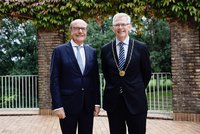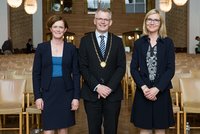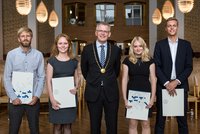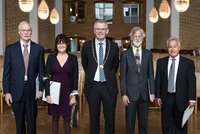- Education
-
Research
Current research
Talent
-
Collaboration
Businesses
Government agencies and institutions
Alumni
-
About AU
Organisation
Job at AU
On 11 September 1928, 64 students took their seats in hired classrooms at ‘University Teaching in Jutland’. 90 years later, 500 people took their seats in the Main Hall to celebrate Aarhus University’s 90th anniversary and the pioneers who created it – and to look to the future.
2018.09.19 |

The 2018 distinguished alumnus is Ulrik Federspiel, MSc in political science, former ambassador and top government official, currently adviser to the executive management of Haldor Topsøe A/S. Photo: Lars Kruse

Professor Lotte Bøgh Andersen and Associate Professor Tove Hedegaard Jørgensen receiving the Aarhus University Anniversary Foundation’s awards. Photo: Lars Kruse

The four recipients of Queen Margrethe II’s travel grant. Photo: Lars Kruse

The four honorary doctors. Photo: Lars Kruse
“´Same procedure as last year, miss Sophie?´ ´Same procedure as every year, James.´ And yes – fundamentally, it’s business as usual at Aarhus University. We’re still educating class after class of young people at the highest international standard. Our research and consultancy services still live up to our motto We seek solid ground in the depths. We’re still creating new knowledge – and we’re sharing knowledge. We’re still changing the world, every single day.”
So spoke Rector Brian Bech Nielsen’s on the occasion of Aarhus University’s 90th anniversary at the annual celebration on 14 September 2018 in the Main Hall, which was attended by employees and partners and friends of the university, including Minister for Higher Education and Science Tommy Ahlers, who was presented with a special birthday wish list on behalf of the university:
The rector also made a pointed comment directed at the minister about the ongoing cutbacks in the university sector:
“One might find it bewildering that the educational system has become a popular victim when cuts need to be found in the annual budget negotiations. And it doesn’t look like year’s finance act is going to be the least bit better. In this area, the ‘same procedure as last year’ has gotten rather out of hand.”
AU Board Chair Connie Hedegaard: AU is reaching out to society
In her speech, Chair of the Board Connie Hedegaard also addressed the university’s motto, We seek solid ground in the depths, and opposed it to the contemporary trend in favour of superficiality, quick questions and quick answers to increasingly complex questions.
“Every day, we strive to achieve the opposite. In a confused age, more and more people are asking ‘What should we believe?’. Believing is not enough – you have to know. This is the fundamental premise of the university. To insist on knowledge, on substance, on depth: we consider this our highest mission.”
At the same time, Hedegaard stressed how important it is for Aarhus University that we constantly bring our knowledge into play in society.
“Aarhus University wants to reach out to society – wants to bring our knowledge into play. And this is one of the areas on which the Board places great emphasis – to strengthen ties to business and industry so that we can learn from one another, so that we can make new discoveries together through the interplay of theory and practice, and to encourage the emergence of more start-ups out of the knowledge Aarhus University helps create. This is what our strategic focus on educating more engineers and on integrating digital knowledge into our degree programmes is about, to take just one example.”
2018 Distinguished Alumnus Ulrik Federspiel: Strengthen the foreign service organisations
This year’s distinguished alumnus is Ulrik Federspiel, MSc in political science, former ambassador and top government official, currently adviser to the executive management of Haldor Topsøe A/S. Ulrik Federspiel’s long career in the foreign service has been closely linked to a number of landmark events in recent Danish history. He was Denmark’s Ambassador to the United States at the time of the 9/11 terrorist attacks in 2001 and during the Afghanistan and Iraq wars. And he was Permanent Secretary of State for Foreign Affairs during the Muhammad crisis and the war in Lebanon, during which he had to evacuate approximately 6,000 Danish citizens in just a few days.
Diplomacy can create peace, and in his speech, Federspiel warned against the dangers of weakening the world’s foreign service organisations:
“Today, the international system and its organisations are adrift, with no clear course. Historically speaking, such periods have always been dangerous. For this reason, the system must be strengthened. Throughout history skilled diplomats have been able to do this, and have steered the international ship safely into harbour. But where are these diplomats today? Many have been lost to budget cuts: because in recent decades, there has been an international tendency to cut back on foreign ministries all around the world, and to disregard their expertise in general. And of course, this doesn’t make becoming a diplomat attractive, and the competencies diminish.”
The 2018 student speaker: Grades aren’t everything
This year’s student speaker, education science student Maria Møller, centred her speech on a personal anecdote about switching degree programmes – and how she has realised on several occasions that learning is not just about quick completion and grades.
“Basically, I think it’s good that there are some learning outcomes defined for each subject. It’s both a good point of departure for the student, and it’s good for the teachers to have something to evaluate in relation to: it’s a kind of safeguard for both parties. However, I also believe that it’s important that we acknowledge that learning is also taking place even when we don’t fulfil the learning outcomes – that we collective articulate that a top grade of 12 is not the only thing that expresses what you can do,” she said.
Photos from the annual celebration
Read all the speeches from the annual celebration (in danish)
Other honours and awards
Professor Lotte Bøgh Andersen, Aarhus University Anniversary Foundation Research Communication Prize
Four students received the HM Queen Margrethe II Travel Grant
Honorary doctorates were conferred on the following four researchers:
Watch videos of the four honorary doctors